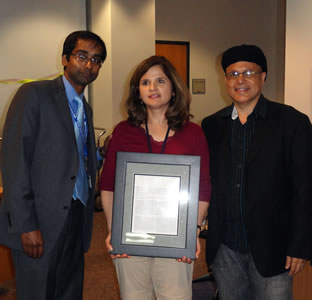Commencement Close-Up: For the love of research, grad will go to St. Jude hospital

UTSA alumnae Annette Rodriguez (center) with mentors Bernard Arulanandam (left) and Edwin Barea-Rodriguez

UTSA alumnae Annette Rodriguez (center) with mentors Bernard Arulanandam (left) and Edwin Barea-Rodriguez
(May 9, 2011)--Annette Rodriguez '89, '05, '10 boasts an accomplishment few Roadrunners can surpass. The San Antonio native has earned three biology degrees from UTSA -- a bachelor's in 1989, a master's in 2005 and a Ph.D. in 2010.
"I learned early on when I was hired by a physical therapy facility that I was not meant to work with patients," she recalls. "When I was dealing with the patients' suffering, I felt it too much and I was getting too emotional. But, I loved the sciences. I knew a career in science was what I wanted to pursue."
The biology major earned her bachelor's in 1989. Shortly thereafter, she was hired at Baylor College of Medicine as a laboratory technician working on analysis of influenza vaccines using animal models and human samples.
As the only tech in the lab, Rodriguez received individualized attention and detailed training from her mentor, Innocent Mbawuike.
"That first research position was a great experience for me," she recalls. "Dr. Mbawuike taught me the importance of conducting experiments carefully and maintaining good records. He strengthened my research skills and was a big influence on my continuation in the field."
But San Antonio called Rodriguez home, and she took back-to-back jobs researching HIV infection at the UT Health Science Center and the Texas Biomedical Research Institute (formerly Southwest Foundation for Biomedical Research). Uncomfortable with the uncertainties of funding, she spent two short years in industry. But, she missed research so much that she returned to the institute and matriculated into UTSA's master's program in biology.
She recalls that part of her life as "the most exciting time in my research career."
"When I was a master's student, I was able to start something from the beginning," Rodriguez said. "I designed my own project, and I had my research published."
But then a mentor stopped her in her tracks.
"One of my thesis advisers, Dr. Krishna Murthy, told me, 'You have your master's degree; you're neither here nor there. If you really want to conduct the research you want to do -- if you want to design your own projects -- you need to go the next step.'"
Rodriguez hadn't considered a Ph.D. program. And frankly, the whole idea was a little intimidating. But, she took the plunge, returning to UTSA for a third time.
To ensure her success, she joined UTSA's MBRS-RISE program, managed by Edwin Barea-Rodriguez, chair of the UTSA Department of Biology, and Gail Taylor, MBRS-RISE assistant program director. The MBRS-RISE program offers academic and financial support to minority students pursuing biomedical research careers. In addition, program workshops help students sharpen their skills in critical areas such as communications, leadership, presentations and writing.
Rodriguez conducted her doctoral research in the laboratory of Bernard Arulanandam, UTSA Jane and Roland Blumberg Professor in Biology, focusing on the Franciscella tularensis bacterium, which causes tularemia. In addition to working with Arulanandam, Rodriguez is grateful to Neal Guentzel, UTSA professor of microbiology, who also "devoted so much of his time to training me during my doctoral studies."
The bacterial pathogenesis research complemented what Rodriguez had learned about viral pathogenesis from prior jobs. Working with the Class A pathogen also gave her experience in a biosafety level III laboratory.
With her doctorate in hand, Rodriguez is ready now to conduct research projects of her own design. Her first challenge awaits at Memphis-based St. Jude Children's Research Hospital in immunologist Thirumala-Devi Kanneganti's laboratory.
She also recently celebrated one last milestone: her wedding to fiance Robert, who also happens to be a successful scientist.
"It has been very important to me to have support from someone who understands the long days and the nature of laboratory work," Rodriguez said with a smile. "My fiance has been a great listener, and he's understood what I was going through as a Ph.D. student. I would not have made it through if I had not had someone supportive at home."
Annette Rodriguez begins her post-doctoral fellowship at St. Jude Children's Research Hospital on May 9.
Events
Join the PEACE Center and Wellbeing Services for Denim Day, a day of learning about the importance of consent and why we wear denim on the last Wednesday of the month each April during Sexual Assault Awareness Month. Stop by our Denim Day display to take a photo in front of our Denim Wall, spin the "Is It Consent?" Wheel, and get a Concha or goodie.
Student Union Window Lounge, Main CampusLearn to use Zotero®, a citation manager that can help you store and organize citations you find during your research. Zotero can generate bibliographies in various styles, insert in-text citations and allow you to share sources with collaborators.
Virtual EventThis event will acknowledge graduating seniors from the McNair Scholars program at UTSA before inducting the new cohort of scholars into the program.
North Paseo Building (NPB 5.140), Main CampusAt this memorable celebration, UTSA graduates will be introduced one-by-one to cross the stage and accept their doctoral degrees.
Arts Building Recital Hall, Main CampusRoadrunner Walk is an event for graduating students to have a memorable walk on campus to celebrate an important milestone and their achievements. Graduates will walk along the Paseo while being celebrated by the UTSA community, friends, and family members.
Student Union Paseo, Main CampusCelebrate the accomplishments of College of Education and Human Development, College for Health, Community and Policy, College of Sciences and University College.
Alamodome, 100 Montana St.Celebrate the accomplishments of Alvarez College of Business, College of Liberal and Fine Arts and Klesse College of Engineering and Integrated Design.
Alamodome, 100 Montana St.

